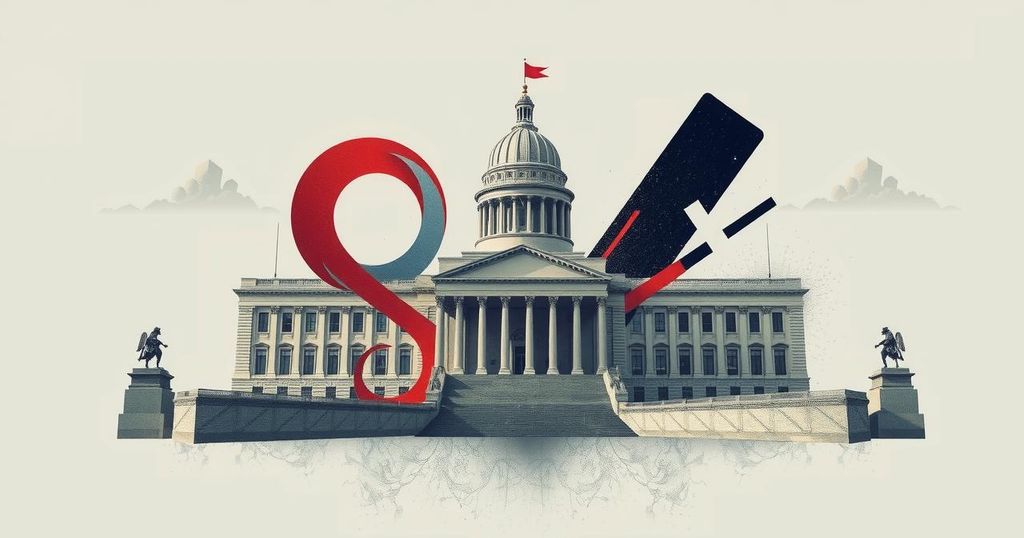The article explores the potential for Bangladesh to evolve into a popular autocracy as constitutional safeguards may fail against a demagogue with popular support. It critiques the Constitution Reform Commission’s reliance on contemporary models of liberal democracy, advocating for more participatory governance inspired by Athenian principles. The analysis highlights the growing influence of social media demagogues and warns of the risks posed by societal divisions and economic disparities to the integrity of democracy.
The notion of Bangladesh becoming a popular autocracy raises concerns regarding the limitations of constitutional safeguards meant to protect democracy. While these measures may deter a universally loathed autocrat like Sheikh Hasina, they may fall short against a demagogue with significant public support. The head of the Constitution Reform Commission, Ali Riaz, pointed out that the proposed changes derived inspiration primarily from contemporary liberal democracies rather than the more participatory Athenian democracy. This begs the question of whether such an approach is the correct one, especially as many liberal democracies face their own crises.
The recent challenges to liberal democracy, particularly in the United States, highlight that strong institutional frameworks are insufficient in preventing authoritarianism. Notably, the American constitutional model has struggled to maintain its democratic integrity in the face of rising populism. The origins of American democracy, characterized by a centralized and representative system, diverged significantly from the Athenian ideal of direct participation. This shift has led to a disconnect between ordinary citizens and political power, limiting authentic democratic engagement and perpetuating systemic inequalities.
Since Karl Marx’s insights, a stark separation has emerged between economic issues and political dynamics, diminishing the capacity of political struggle over class domination. The result is that economic exploitation often remains unchallenged in political discourse, with grievances directed at marginalized groups rather than those with economic power. Consequently, political power is transferred to the elite economic sphere, narrowing the scope for true democratic oversight and representation.
As Bangladesh contemplates constitutional revisions, it must recognize similar economic and environmental pressures that threaten its democratic framework. The limited representation proposed for the upper house, consisting of a few non-partisan citizens nominated by the President, is unlikely to create substantial change. Without a robust system for citizen engagement, such token representation may merely reinforce the status quo instead of fostering real democratic accountability or oversight.
Exploring historical Athenian reforms may offer valuable lessons on enhancing representation. Implementing a legislature composed entirely of citizens selected by lot could provide a counterbalance to traditional party politics, allowing for more direct accountability and oversight by ordinary constituents. Such a model would blend representative and direct democracy, ensuring that citizens play a crucial role in defending and promoting democratic principles.
Concerns about the emergence of a popular autocracy in Bangladesh are not unfounded. The increase in influence held by social media demagogues parallels global trends of populism, potentially leading to divisions within society. Future autocrats may leverage popular sentiment to achieve electoral success, manipulating majoritarian narratives while marginalizing outgroups. This dynamic could undermine the political landscape, complicating unified opposition against authoritarianism.
While proposed reforms aim to create fair competition among political parties, they do not sufficiently empower ordinary citizens. A lack of democratic oversight mechanisms may result in Bangladesh descending into a different authoritarian regime. To avoid this fate, politicians must engage with the citizenry, fostering a spirit of democratic self-defense and political maturity across parties.
Ultimately, without bold innovation in Bangladesh’s democratic processes, the nation risks repeating historical patterns of authoritarianism. It remains crucial for all political entities to adapt, with a focus on inclusivity and citizen engagement, ensuring a robust defense of democracy that can withstand emerging threats to its integrity.
In conclusion, Bangladesh faces significant risks as it navigates potential shifts toward authoritarianism. Constitutional reforms alone may not suffice to address the economic and social challenges propelling this change. Without meaningful citizen engagement and oversight, the nation could experience a resurgence of popular autocracy. Thus, fostering an inclusive political discourse is paramount to preserving Bangladesh’s democratic future.
Original Source: netra.news




